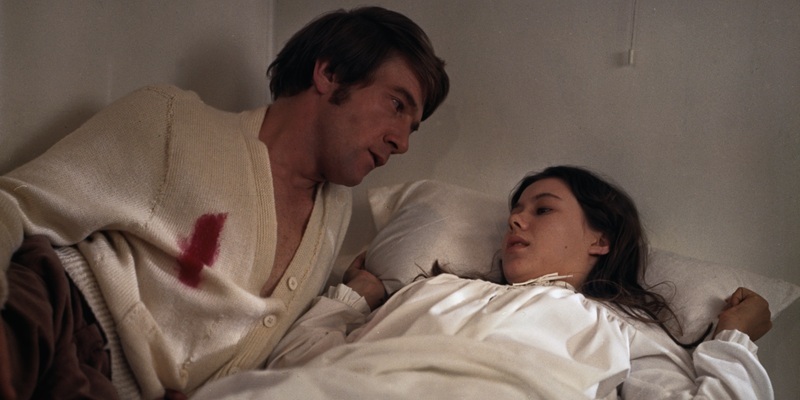
A teenage girl suspects her half-brother, with whom she is smitten, of
being responsible for a series of murders.
Review by
Eric Hillis
Directed by: David Greene
Starring: Jenny Agutter, Bryan Marshall, Clare Sutcliffe, Simon Ward, Gregory
Phillips, Lana Morris

British director David Greene is perhaps best known for his work in
American television, helming such iconic mini-series as
Roots and Rich Man, Poor Man. Along with the likes of
John Llewellyn Moxey
and Jimmy Sangster, he's another British talent lost to the US TV production
line thanks to the decline of the UK film industry in the 1970s. But for a
brief period he was quietly establishing himself as a filmmaker of note in
his home country with films like
The Shuttered Room, Sebastian, The Strange Affair and the
newly restored I Start Counting, one of the more intriguing thrillers of the era, thanks largely to a
striking turn from a young Jenny Agutter.

Adapted by screenwriter Richard Harris from
Audrey Erskine Lindop's novel, this 1969 film stars Agutter as Wynne,
a 14-year-old adoptee who recently moved with her family to a newly erected
block of flats in one of the many "New Towns" that were springing up in
Southern England in the mid 20th century. Wynne is madly in love with her
32-year-old step-brother George (Bryan Marshall), for whom she would
do anything. Her allegiance to George is tested when she begins to suspect
him of being responsible for a recent spate of murders of young women in the
area.
Finding a blood-stained cardigan thrown in the bin by George, and learning
that he's been lying about where he spends his free time, Wynne goes into
Nancy Drew mode to find out what her step-brother is up to. As the evidence
appears to mount in the case against George, Wynne grows increasingly torn
over whether to turn him in or protect him. Meanwhile, other possible
suspects are posited in the form of Wynne's other older step-brother Len (Gregory Phillips), a true crime obsessive who keeps newspaper clippings related to the
killings, and a creepy young bus conductor (Simon Ward) who scolds
Wynne for the shortness of her skirt while simultaneously leering at her
legs.

This era of British filmmaking saw a spate of psychological thrillers that
suggested the swinging sixties was entering the hangover period of the '70s.
Rather than mummies, wolfmen and vampires, the villains of these movies were
handsome young men with the sort of faces that adorned teenage girls'
bedroom walls. You might theorise that this was something of a conservative
reaction by older filmmakers who resented the fun young people had been
having in a decade of mass social and cultural revolution, with mini-skirted
young women butchered by long-haired pretty boys. But given what we now know
about the likes of Jimmy Saville, Jonathan King et al, perhaps they were
onto something. The three primary suspects here are all played by actors
whom you could picture forming a beat combo together. At a time when young
people had recently developed a profound mistrust of their elders, it must
have been quite jarring for films to suggest danger lurked among their
peers.
I Start Counting combines its thriller aspects with a
coming-of-age drama, and as the latter it's rather sweet and often amusing.
Much comedy is mined from Wynne's innocence, such as her grilling of an
embarrassed priest on the Church's view of incest. Agutter perfectly
captures Wynne's contradictory mix of naivete and precociousness. Like many
teens, Wynne is torn between wanting to grow up and enter the adult world
while wishing to retain the innocence of childhood. The latter is
represented by her old family home on the outskirts of town, which she
frequently visits, trying to keep it clean despite the wrecking ball edging
ever closer to its destruction. There, Wynne recalls happier times in
flashbacks, but also a disturbing incident involving a girlfriend of
George's that she now links to his new life as a serial killer.

That wrecking ball isn't just coming for Wynne's old home, it's about to
turn the '60s into rubble too. I Start Counting seems to know
that the party is over, that troubling times lie ahead for Britain, with its
film industry but one victim to come. Even the weather is notably nicer in
British films from the '60s than those made during the constantly overcast
'70s. With its scenes set in rowdy coffee bars and record shops with
psychedelic music blasting from listening booths,
I Start Counting is something of a time capsule of an era
coming to an end. Despite how remarkable she is here and in other youthful
turns in the likes of The Railway Children and
Walkabout, Agutter never quite got the career she deserved (partly due to the dearth
of good female roles in '70s cinema), and like Wynne, I hope she cherished
this period as I Start Counting might be her finest
work.

New interviews with Jenny Agutter and screenwriter Richard Harris;
featurette on the work of composer Basil Kirchin; three shorts from the
BFI archive on New Towns; Danger on Dartmoor - a 1980
Children's Film Foundation movie scripted by Audrey Erskine Lindop;
Don't Be Like Brenda - a cautionary 1973 short on teenage
promiscuity; video essay by Chris O'Neill; feature commentary by film
historian Samm Deighan; trailer; image gallery.

